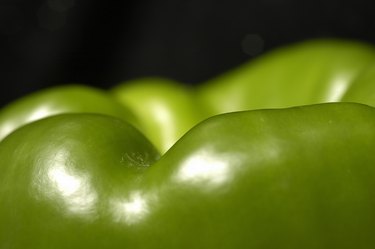
Coumadin is a medication that is prescribed to patients who have a history of blood clots in their legs, arms, heart or brain; a history of heart attacks or strokes; a replacement heart valve; abnormal heart rhythms; a large heart; or other cardiac complications. Coumadin reduces the clotting ability of your blood and thus reduces the formation of clots. While taking Coumadin, you must be aware of certain foods that can affect the effects of Coumadin in your body. Certain foods, like peppers, naturally thin your blood and, if eaten while taking Coumadin, could increase your risk of bleeding and bruising.
Green Peppers
Video of the Day
Green peppers, such as the bell peppers, are very high in vitamin A and C, beta carotene and plant phenols known as coumarins. Their scientific name is Capsicum annum and while most consider them to be a vegetable, they are technically a fruit. According to the USDA Nutritional Database, a small green pepper has 15 calories and is a source of calcium, magnesium, phosphorus, and potassium. It has 59.5mg of vitamin C, 154mcg of beta carotene, 252mcg of lutein plus zeaxanthin, and 274 IU of vitamin A.
Video of the Day
Coumarins
Coumarins are naturally found phytochemicals in green peppers. They can also be found in fruits and vegetables such as tomatoes, strawberries and carrots. The specific coumarin found in green peppers is scopoletin. Coumarin has natural blood-thinning, anti-fungicidal and anti-tumor properties and should not be taken in large quantities by patients who are on Coumadin as it may increase their risk for bruising and bleeding by thinning the blood too much.
Vitamin C
Vitamin C is a vitamin commonly associated with the prevention of colds. According to the National Institutes of Health, vitamin C is also used to treat other infections such as bronchitis, HIV, stomach ulcers, skin boils and bladder infections. Vitamin C is found naturally in most vegetables and fruits, with citrus fruits having a significant amount. Vitamin C, in large amounts, can decrease the effectiveness of medications like Coumadin and increase risk of clotting.
Considerations
Green peppers contain natural properties that can both increase the risk of bleeding as well as decrease the effectiveness of the blood-thinning properties of Coumadin. When your physician prescribes your Coumadin medication, it is important to talk with him regarding your diet and the regular foods you eat. He may advise you to completely avoid eating certain foods or at least restrict them. If foods with natural blood-thinning properties, like peppers, are a part of your diet, your physician may change your Coumadin dosage to take this into consideration. Taking Coumadin requires regular blood tests to monitor its effectiveness and your bleeding risk. Have regular blood tests and allow your physician to regulate your clotting times and adjust your prescription and diet accordingly.
- USDA Nutritional Database: Peppers, Sweet, Green, Raw
- Produce Oasis: Green Bell Pepper
- MedlinePlus; Warfarin; September 1, 2008
- MedlinePlus; Taking Warfarin (Coumadin); February 23, 2011
- Phytochemicals: What is Coumarin?
- Fruits Info: Sweet Pepper
- MedlinePlus; Vitamin C (Ascorbic Acid); July 25, 2011